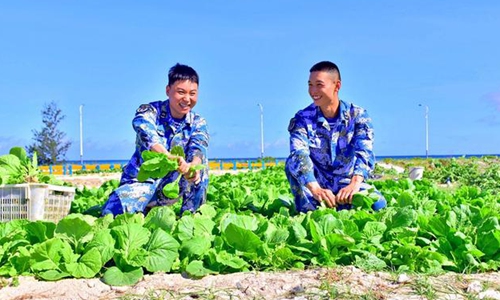Harvesting vegetables with 'sand-to-earth' tech on S. China Sea island beach
By Shan Jie Source:Globaltimes.cn Published: 2020/5/19 23:54:20

Photo: Chongqing Jiaotong University
Chinese navy garrisoned on an island in the Xisha Islands of the South China Sea recently harvested 750 kilogram of vegetables on sandy beaches for the first time, using technology which experts said could support communities on islands.
Seven kinds of vegetables, including Pakchoi cabbage, lettuce and baby Chinese cabbage, were harvested on a "sand to earth" experimental field on Yongxing Island in Sansha city, South China's Hainan Province, on May 12, according to a report from the Chinese navy on Tuesday.
"The technology will be promoted on a large scale, which could solve the problem of military forces and civilians on islands lacking enough green vegetables," a navy officer said, according to the report.
The navy's garrisoned force in Xisha worked with the "sand to earth" research team from the Chongqing Jiaotong University in Southwest China for four months to achieve the "miracle."
According to the navy's report, naval officers and scientists mixed a botanical fiber adhesive powder material into the sand. After watering, the sand became soil. Seeds planted in a 0.5-mu field on April 4 grew into more than 750 kilograms of harvests after one month, which means vegetables could be harvested five or six times a year.
The team from Chongqing Jiaotong University had changed 4,000 mu of desert into farming land in North China's Inner Mongolia Autonomous Region in 2017.
The breakthrough also counters international theories, including those in a 2016 arbitration, that islands in the South China Sea could not support communities of their own, Chen Xiangmiao, an assistant research fellow at the National Institute for South China Sea Studies, told the Global Times on Tuesday.
"Now China's capability of being able to support civilians on these islands would allow more people to live on the islands," Chen noted.
The high temperatures, high humidity and high salt content had made farming extremely difficult on the South China Sea islands, Chen said.
"Being able to grow vegetables makes it possible to take the next step, such as raising pigs or chickens. An ecological cycle would make the islands more suitable for humans to live there for a longer time," Chen said. "In the future, each island could form a small independent community."
Since the 1970s, forces stationed in the islands have relied on green-leaf vegetables to be shipped to them. But sometimes boats could not reach the islands due to bad weather, and officers could only eat seaweed, pumpkins or beancurd sticks, causing nutritional issues, according to the navy report.
Navy officers tried bringing soil from the mainland, but they could only grow a small amount of vegetables. In 2007, the Ministry of Science and Technology built a vegetable demonstrative base on Yongxing island. Vegetable greenhouses were also built on some islands.
Sansha city was founded in 2012. With more and more navy officers and civilians moving onto the islands, the need for green-leaf vegetables has been increasing.